T.S.艾略特与《荒原》
- 格式:ppt
- 大小:1.11 MB
- 文档页数:32
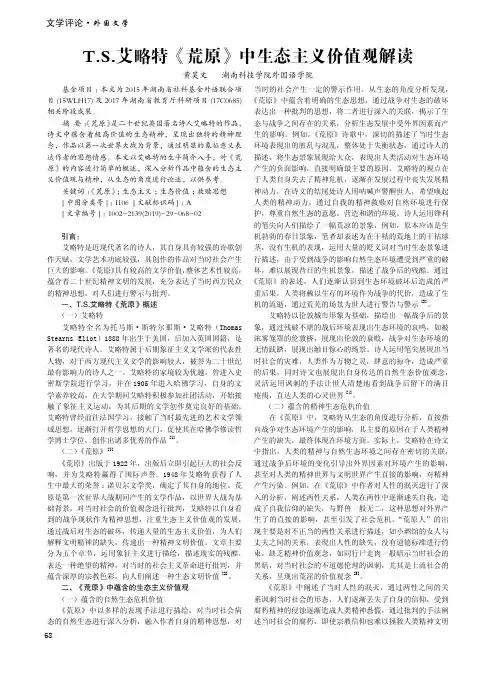
文学评论·外国文学T.S.艾略特《荒原》中生态主义价值观解读黄昊文 湖南科技学院外国语学院基金项目:本文为2015年湖南省社科基金外语联合项目(15WLH17)及2017年湖南省教育厅科研项目(17C0685)相关阶段成果。
摘 要:《荒原》是二十世纪英国著名诗人艾略特的作品,诗文中蕴含着极高价值的生态精神,呈现出独特的精神理念,作品以第一次世界大战为背景,通过明显的象征意义表达作者的思想情感。
本文以艾略特的生平简介入手,对《荒原》的内容进行简单的概述,深入分析作品中蕴含的生态主义价值观与精神,从生态的角度进行论述,以供参考。
关键词:《荒原》;生态主义;生态价值;救赎思想[中图分类号]:I106 [文献标识码]:A[文章编号]:1002-2139(2019)-29-068-02引言:艾略特是近现代著名的诗人,其自身具有较强的诗歌创作天赋,文学艺术功底较强,其创作的作品对当时社会产生巨大的影响。
《荒原》具有较高的文学价值,整体艺术性较高,蕴含着二十世纪精神文明的发展,充分表达了当时西方民众的精神思想,对人们进行警示与批判。
一、T.S.艾略特《荒原》概述(一)艾略特艾略特全名为托马斯•斯特尔那斯•艾略特(Thomas Stearns Eliot)1888年出生于美国,后加入英国国籍,是著名的现代诗人。
艾略特属于后期象征主义文学派的代表性人物,对于西方现代主义文学的影响较大,被誉为二十世纪最有影响力的诗人之一。
艾略特的家境较为优越,曾进入史密斯学院进行学习,并在1905年进入哈佛学习,自身的文学素养较高,在大学期间艾略特积极参加社团活动,开始接触了象征主义运动,为其后期的文学创作奠定良好的基础。
艾略特曾经前往法国学习,接触了当时最先进的艺术文学领域思想,逐渐打开哲学思想的大门,促使其在哈佛学修读哲学博士学位,创作出诸多优秀的作品[1]。
(二)《荒原》[1]《荒原》出版于1922年,出版后立即引起巨大的社会反响,并为艾略特赢得了国际声誉。
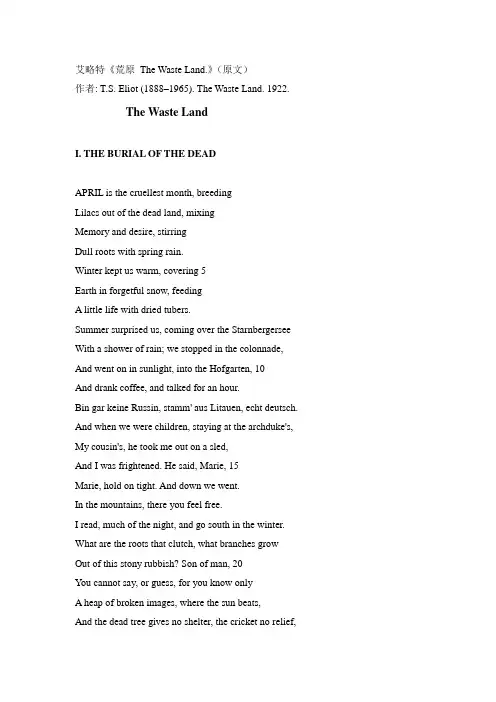
艾略特《荒原The Waste Land.》(原文)作者: T.S. Eliot (1888–1965). The Waste Land. 1922.The Waste LandI. THE BURIAL OF THE DEADAPRIL is the cruellest month, breedingLilacs out of the dead land, mixingMemory and desire, stirringDull roots with spring rain.Winter kept us warm, covering 5Earth in forgetful snow, feedingA little life with dried tubers.Summer surprised us, coming over the Starnbergersee With a shower of rain; we stopped in the colonnade, And went on in sunlight, into the Hofgarten, 10And drank coffee, and talked for an hour.Bin gar keine Russin, stamm' aus Litauen, echt deutsch. And when we were children, staying at the archduke's, My cousin's, he took me out on a sled,And I was frightened. He said, Marie, 15Marie, hold on tight. And down we went.In the mountains, there you feel free.I read, much of the night, and go south in the winter. What are the roots that clutch, what branches grow Out of this stony rubbish? Son of man, 20You cannot say, or guess, for you know onlyA heap of broken images, where the sun beats,And the dead tree gives no shelter, the cricket no relief,And the dry stone no sound of water. OnlyThere is shadow under this red rock, 25(Come in under the shadow of this red rock),And I will show you something different from either Your shadow at morning striding behind youOr your shadow at evening rising to meet you;I will show you fear in a handful of dust. 30Frisch weht der WindDer Heimat zu.Mein Irisch Kind,Wo weilest du?'You gave me hyacinths first a year ago; 35'They called me the hyacinth girl.'—Yet when we came back, late, from the Hyacinth garden, Your arms full, and your hair wet, I could notSpeak, and my eyes failed, I was neitherLiving nor dead, and I knew nothing, 40Looking into the heart of light, the silence.Od' und leer das Meer.Madame Sosostris, famous clairvoyante,Had a bad cold, neverthelessIs known to be the wisest woman in Europe, 45With a wicked pack of cards. Here, said she,Is your card, the drowned Phoenician Sailor,(Those are pearls that were his eyes. Look!)Here is Belladonna, the Lady of the Rocks,The lady of situations. 50Here is the man with three staves, and here the Wheel, And here is the one-eyed merchant, and this card,Which is blank, is something he carries on his back,Which I am forbidden to see. I do not findThe Hanged Man. Fear death by water. 55I see crowds of people, walking round in a ring.Thank you. If you see dear Mrs. Equitone,Tell her I bring the horoscope myself:One must be so careful these days.Unreal City, 60Under the brown fog of a winter dawn,A crowd flowed over London Bridge, so many,I had not thought death had undone so many.Sighs, short and infrequent, were exhaled,And each man fixed his eyes before his feet. 65Flowed up the hill and down King William Street,To where Saint Mary Woolnoth kept the hoursWith a dead sound on the final stroke of nine.There I saw one I knew, and stopped him, crying 'Stetson! 'You who were with me in the ships at Mylae! 70'That corpse you planted last year in your garden,'Has it begun to sprout? Will it bloom this year?'Or has the sudden frost disturbed its bed?'Oh keep the Dog far hence, that's friend to men,'Or with his nails he'll dig it up again! 75'You! hypocrite lecteur!—mon semblable,—mon frère!' II. A GAME OF CHESSTHE Chair she sat in, like a burnished throne,Glowed on the marble, where the glassHeld up by standards wrought with fruited vinesFrom which a golden Cupidon peeped out 80(Another hid his eyes behind his wing)Doubled the flames of sevenbranched candelabra Reflecting light upon the table asThe glitter of her jewels rose to meet it,From satin cases poured in rich profusion; 85In vials of ivory and coloured glassUnstoppered, lurked her strange synthetic perfumes, Unguent, powdered, or liquid—troubled, confusedAnd drowned the sense in odours; stirred by the airThat freshened from the window, these ascended 90In fattening the prolonged candle-flames,Flung their smoke into the laquearia,Stirring the pattern on the coffered ceiling.Huge sea-wood fed with copperBurned green and orange, framed by the coloured stone, 95 In which sad light a carvèd dolphin swam.Above the antique mantel was displayedAs though a window gave upon the sylvan sceneThe change of Philomel, by the barbarous kingSo rudely forced; yet there the nightingale 100Filled all the desert with inviolable voiceAnd still she cried, and still the world pursues,'Jug Jug' to dirty ears.And other withered stumps of timeWere told upon the walls; staring forms 105Leaned out, leaning, hushing the room enclosed. Footsteps shuffled on the stair.Under the firelight, under the brush, her hairSpread out in fiery pointsGlowed into words, then would be savagely still. 110'My nerves are bad to-night. Yes, bad. Stay with me.'Speak to me. Why do you never speak? Speak.'What are you thinking of? What thinking? What?'I never know what you are thinking. Think.'I think we are in rats' alley 115Where the dead men lost their bones.'What is that noise?'The wind under the door.'What is that noise now? What is the wind doing?' Nothing again nothing. 120'Do'You know nothing? Do you see nothing? Do you remember 'Nothing?'I rememberThose are pearls that were his eyes. 125'Are you alive, or not? Is there nothing in your head?'ButO O O O that Shakespeherian Rag—It's so elegantSo intelligent 130'What shall I do now? What shall I do?''I shall rush out as I am, and walk the street'With my hair down, so. What shall we do to-morrow?'What shall we ever do?'The hot water at ten. 135And if it rains, a closed car at four.And we shall play a game of chess,Pressing lidless eyes and waiting for a knock upon the door. When Lil's husband got demobbed, I said—I didn't mince my words, I said to her myself, 140HURRY UP PLEASE IT'S TIMENow Albert's coming back, make yourself a bit smart.He'll want to know what you done with that money he gave you To get yourself some teeth. He did, I was there.You have them all out, Lil, and get a nice set, 145He said, I swear, I can't bear to look at you.And no more can't I, I said, and think of poor Albert,He's been in the army four years, he wants a good time,And if you don't give it him, there's others will, I said.Oh is there, she said. Something o' that, I said. 150Then I'll know who to thank, she said, and give me a straight look. HURRY UP PLEASE IT'S TIMEIf you don't like it you can get on with it, I said.Others can pick and choose if you can't.But if Albert makes off, it won't be for lack of telling. 155You ought to be ashamed, I said, to look so antique.(And her only thirty-one.)I can't help it, she said, pulling a long face,It's them pills I took, to bring it off, she said.(She's had five already, and nearly died of young George.) 160 The chemist said it would be alright, but I've never been the same. You are a proper fool, I said.Well, if Albert won't leave you alone, there it is, I said,What you get married for if you don't want children?HURRY UP PLEASE IT'S TIME 165Well, that Sunday Albert was home, they had a hot gammon,And they asked me in to dinner, to get the beauty of it hot—HURRY UP PLEASE IT'S TIMEHURRY UP PLEASE IT'S TIMEGoonight Bill. Goonight Lou. Goonight May. Goonight. 170Ta ta. Goonight. Goonight.Good night, ladies, good night, sweet ladies, good night, good night. III. THE FIRE SERMONTHE river's tent is broken: the last fingers of leafClutch and sink into the wet bank. The windCrosses the brown land, unheard. The nymphs are departed. 175 Sweet Thames, run softly, till I end my song.The river bears no empty bottles, sandwich papers,Silk handkerchiefs, cardboard boxes, cigarette endsOr other testimony of summer nights. The nymphs are departed. And their friends, the loitering heirs of city directors; 180 Departed, have left no addresses.By the waters of Leman I sat down and wept...Sweet Thames, run softly till I end my song,Sweet Thames, run softly, for I speak not loud or long.But at my back in a cold blast I hear 185The rattle of the bones, and chuckle spread from ear to ear.A rat crept softly through the vegetationDragging its slimy belly on the bankWhile I was fishing in the dull canalOn a winter evening round behind the gashouse 190Musing upon the king my brother's wreckAnd on the king my father's death before him.White bodies naked on the low damp groundAnd bones cast in a little low dry garret,Rattled by the rat's foot only, year to year. 195But at my back from time to time I hearThe sound of horns and motors, which shall bringSweeney to Mrs. Porter in the spring.O the moon shone bright on Mrs. PorterAnd on her daughter 200They wash their feet in soda waterEt, O ces voix d'enfants, chantant dans la coupole!Twit twit twitJug jug jug jug jug jugSo rudely forc'd. 205TereuUnreal CityUnder the brown fog of a winter noonMr. Eugenides, the Smyrna merchantUnshaven, with a pocket full of currants 210C.i.f. London: documents at sight,Asked me in demotic FrenchTo luncheon at the Cannon Street HotelFollowed by a weekend at the Metropole.At the violet hour, when the eyes and back 215Turn upward from the desk, when the human engine waits Like a taxi throbbing waiting,I Tiresias, though blind, throbbing between two lives,Old man with wrinkled female breasts, can seeAt the violet hour, the evening hour that strives 220 Homeward, and brings the sailor home from sea,The typist home at teatime, clears her breakfast, lightsHer stove, and lays out food in tins.Out of the window perilously spreadHer drying combinations touched by the sun's last rays, 225 On the divan are piled (at night her bed)Stockings, slippers, camisoles, and stays.I Tiresias, old man with wrinkled dugs Perceived the scene, and foretold the rest—I too awaited the expected guest. 230He, the young man carbuncular, arrives,A small house agent's clerk, with one bold stare, One of the low on whom assurance sitsAs a silk hat on a Bradford millionaire.The time is now propitious, as he guesses, 235 The meal is ended, she is bored and tired, Endeavours to engage her in caressesWhich still are unreproved, if undesired. Flushed and decided, he assaults at once; Exploring hands encounter no defence; 240His vanity requires no response,And makes a welcome of indifference.(And I Tiresias have foresuffered allEnacted on this same divan or bed;I who have sat by Thebes below the wall 245 And walked among the lowest of the dead.) Bestows on final patronising kiss,And gropes his way, finding the stairs unlit... She turns and looks a moment in the glass, Hardly aware of her departed lover; 250Her brain allows one half-formed thought to pass: 'Well now that's done: and I'm glad it's over.' When lovely woman stoops to folly andPaces about her room again, alone,She smoothes her hair with automatic hand, 255 And puts a record on the gramophone.'This music crept by me upon the waters'And along the Strand, up Queen Victoria Street.O City city, I can sometimes hearBeside a public bar in Lower Thames Street, 260 The pleasant whining of a mandolineAnd a clatter and a chatter from withinWhere fishmen lounge at noon: where the wallsOf Magnus Martyr holdInexplicable splendour of Ionian white and gold. 265 The river sweatsOil and tarThe barges driftWith the turning tideRed sails 270WideTo leeward, swing on the heavy spar.The barges washDrifting logsDown Greenwich reach 275Past the Isle of Dogs.Weialala leiaWallala leialalaElizabeth and LeicesterBeating oars 280The stern was formedA gilded shellRed and goldThe brisk swellRippled both shores 285Southwest windCarried down streamThe peal of bellsWhite towersWeialala leia 290Wallala leialala'Trams and dusty trees.Highbury bore me. Richmond and Kew Undid me. By Richmond I raised my knees Supine on the floor of a narrow canoe.' 295'My feet are at Moorgate, and my heart Under my feet. After the eventHe wept. He promised "a new start".I made no comment. What should I resent?''On Margate Sands. 300I can connectNothing with nothing.The broken fingernails of dirty hands.My people humble people who expect Nothing.' 305la laTo Carthage then I cameBurning burning burning burningO Lord Thou pluckest me outO Lord Thou pluckest 310burningIV. DEATH BY WATERPHLEBAS the Phoenician, a fortnight dead, Forgot the cry of gulls, and the deep seas swell And the profit and loss.A current under sea 315Picked his bones in whispers. As he rose and fellHe passed the stages of his age and youthEntering the whirlpool.Gentile or JewO you who turn the wheel and look to windward, 320 Consider Phlebas, who was once handsome and tall as you.V. WHAT THE THUNDER SAIDAFTER the torchlight red on sweaty facesAfter the frosty silence in the gardensAfter the agony in stony placesThe shouting and the crying 325Prison and place and reverberationOf thunder of spring over distant mountainsHe who was living is now deadWe who were living are now dyingWith a little patience 330Here is no water but only rockRock and no water and the sandy roadThe road winding above among the mountainsWhich are mountains of rock without waterIf there were water we should stop and drink 335 Amongst the rock one cannot stop or thinkSweat is dry and feet are in the sandIf there were only water amongst the rockDead mountain mouth of carious teeth that cannot spit Here one can neither stand nor lie nor sit 340There is not even silence in the mountainsBut dry sterile thunder without rainThere is not even solitude in the mountainsBut red sullen faces sneer and snarlFrom doors of mudcracked housesIf there were water 345And no rockIf there were rockAnd also waterAnd waterA spring 350A pool among the rockIf there were the sound of water onlyNot the cicadaAnd dry grass singingBut sound of water over a rock 355Where the hermit-thrush sings in the pine trees Drip drop drip drop drop drop dropBut there is no waterWho is the third who walks always beside you? When I count, there are only you and I together 360 But when I look ahead up the white roadThere is always another one walking beside you Gliding wrapt in a brown mantle, hoodedI do not know whether a man or a woman—But who is that on the other side of you? 365 What is that sound high in the airMurmur of maternal lamentationWho are those hooded hordes swarmingOver endless plains, stumbling in cracked earth Ringed by the flat horizon only 370What is the city over the mountainsCracks and reforms and bursts in the violet airFalling towersJerusalem Athens AlexandriaVienna London 375UnrealA woman drew her long black hair out tightAnd fiddled whisper music on those stringsAnd bats with baby faces in the violet lightWhistled, and beat their wings 380And crawled head downward down a blackened wallAnd upside down in air were towersTolling reminiscent bells, that kept the hoursAnd voices singing out of empty cisterns and exhausted wells. In this decayed hole among the mountains 385In the faint moonlight, the grass is singingOver the tumbled graves, about the chapelThere is the empty chapel, only the wind's home.It has no windows, and the door swings,Dry bones can harm no one. 390Only a cock stood on the rooftreeCo co rico co co ricoIn a flash of lightning. Then a damp gustBringing rainGanga was sunken, and the limp leaves 395Waited for rain, while the black cloudsGathered far distant, over Himavant.The jungle crouched, humped in silence.Then spoke the thunderD A 400Datta: what have we given?My friend, blood shaking my heartThe awful daring of a moment's surrenderWhich an age of prudence can never retractBy this, and this only, we have existed 405Which is not to be found in our obituariesOr in memories draped by the beneficent spiderOr under seals broken by the lean solicitorIn our empty roomsD A 410Dayadhvam: I have heard the keyTurn in the door once and turn once onlyWe think of the key, each in his prisonThinking of the key, each confirms a prisonOnly at nightfall, aetherial rumours 415Revive for a moment a broken CoriolanusD ADamyata: The boat respondedGaily, to the hand expert with sail and oarThe sea was calm, your heart would have responded 420 Gaily, when invited, beating obedientTo controlling handsI sat upon the shoreFishing, with the arid plain behind meShall I at least set my lands in order? 425London Bridge is falling down falling down falling down Poi s'ascose nel foco che gli affinaQuando fiam ceu chelidon—O swallow swallowLe Prince d'Aquitaine à la tour abolieThese fragments I have shored against my ruins 430Why then Ile fit you. Hieronymo's mad againe. Datta. Dayadhvam. Damyata.Shantih shantih shantih。
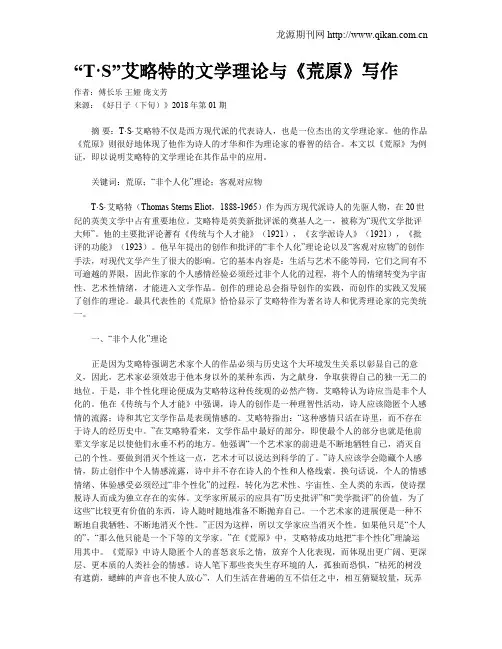
“T·S”艾略特的文学理论与《荒原》写作作者:傅长乐王娅庞文芳来源:《好日子(下旬)》2018年第01期摘要:T·S·艾略特不仅是西方现代派的代表诗人,也是一位杰出的文学理论家。
他的作品《荒原》则很好地体现了他作为诗人的才华和作为理论家的睿智的结合。
本文以《荒原》为例证,即以说明艾略特的文学理论在其作品中的应用。
关键词:荒原;“非个人化”理论;客观对应物T·S·艾略特(Thomas Sterns Eliot,1888-1965)作为西方现代派诗人的先驱人物,在20世纪的英美文学中占有重要地位。
艾略特是英美新批评派的奠基人之一,被称为“现代文学批评大师”。
他的主要批评论蓍有《传统与个人才能》(1921),《玄学派诗人》(1921),《批评的功能》(1923)。
他早年提出的创作和批评的“非个人化”理论论以及“客观对应物”的创作手法,对现代文学产生了很大的影响。
它的基本内容是:生活与艺术不能等同,它们之间有不可逾越的界限,因此作家的个人感情经验必须经过非个人化的过程,将个人的情绪转变为宇宙性、艺术性情绪,才能进入文学作品。
创作的理论总会指导创作的实践,而创作的实践又发展了创作的理论。
最具代表性的《荒原》恰恰显示了艾略特作为著名诗人和优秀理论家的完美统一。
一、“非个人化”理论正是因为艾略特强调艺术家个人的作品必须与历史这个大环境发生关系以彰显自己的意义,因此,艺术家必须效忠于他本身以外的某种东西,为之献身,争取获得自己的独一无二的地位。
于是,非个性化理论便成为艾略特这种传统观的必然产物。
艾略特认为诗应当是非个人化的。
他在《传统与个人才能》中强调,诗人的创作是一种理智性活动,诗人应该隐匿个人感情的流露;诗和其它文学作品是表现情感的。
艾略特指出:“这种感情只活在诗里,而不存在于诗人的经历史中。
”在艾略特看来,文学作品中最好的部分,即使最个人的部分也就是他前辈文学家足以使他们永垂不朽的地方。
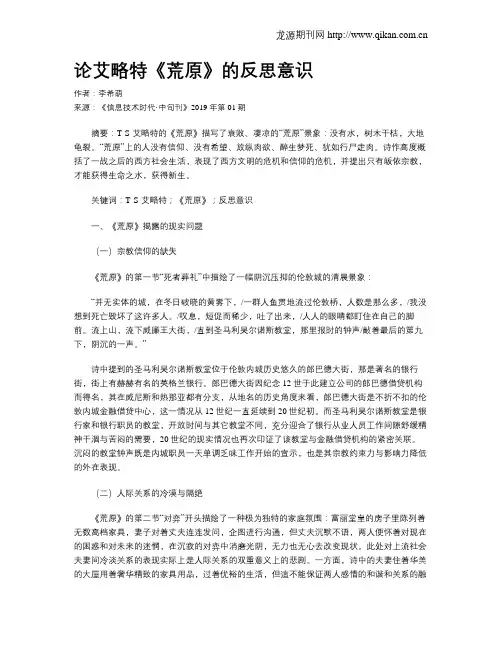
论艾略特《荒原》的反思意识作者:李希萌来源:《信息技术时代·中旬刊》2019年第01期摘要:T·S·艾略特的《荒原》描写了衰败、凄凉的“荒原”景象:没有水,树木干枯,大地龟裂。
“荒原”上的人没有信仰、没有希望、放纵肉欲、醉生梦死、犹如行尸走肉。
诗作高度概括了一战之后的西方社会生活,表现了西方文明的危机和信仰的危机,并提出只有皈依宗教,才能获得生命之水,获得新生。
关键词:T·S·艾略特;《荒原》;反思意识一、《荒原》揭露的现实问题(一)宗教信仰的缺失《荒原》的第一节“死者葬礼”中描绘了一幅阴沉压抑的伦敦城的清晨景象:“并无实体的城,在冬日破晓的黄雾下,/一群人鱼贯地流过伦敦桥,人数是那么多,/我没想到死亡毁坏了这许多人。
/叹息,短促而稀少,吐了出来,/人人的眼睛都盯住在自己的脚前。
流上山,流下威廉王大街,/直到圣马利吴尔诺斯教堂,那里报时的钟声/敲着最后的第九下,阴沉的一声。
”诗中提到的圣马利吴尔诺斯教堂位于伦敦内城历史悠久的郎巴德大街,那是著名的银行街,街上有赫赫有名的英格兰银行。
郎巴德大街因纪念 12 世于此建立公司的郎巴德借贷机构而得名,其在威尼斯和热那亚都有分支,从地名的历史角度来看,郎巴德大街是不折不扣的伦敦内城金融借贷中心,这一情况从 12 世纪一直延续到 20 世纪初。
而圣马利吴尔诺斯教堂是银行家和银行职员的教堂,开放时间与其它教堂不同,充分迎合了银行从业人员工作间隙舒缓精神干涸与苦闷的需要,20 世纪的现实情况也再次印证了该教堂与金融借贷机构的紧密关联。
沉闷的教堂钟声既是内城职员一天单调乏味工作开始的宣示,也是其宗教约束力与影响力降低的外在表现。
(二)人际关系的冷漠与隔绝《荒原》的第二节“对弈”开头描绘了一种极为独特的家庭氛围:富丽堂皇的房子里陈列着无数高档家具,妻子对着丈夫连连发问,企图进行沟通,但丈夫沉默不语,两人便怀着对现在的困惑和对未来的迷惘,在沉寂的对弈中消磨光阴,无力也无心去改变现状。
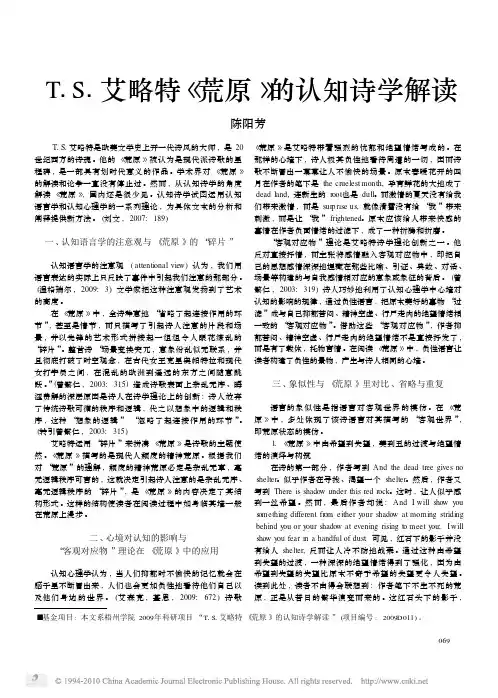
069 T 1S 1艾略特《荒原》的认知诗学解读陈阳芳■基金项目:本文系梧州学院2009年科研项目“T 1S 1艾略特《荒原》的认知诗学解读”(项目编号:2009D011)。
T 1S 1艾略特是欧美文学史上开一代诗风的大师,是20世纪西方的诗魂。
他的《荒原》被认为是现代派诗歌的里程碑,是一部具有划时代意义的作品。
学术界对《荒原》的解读和论争一直没有停止过。
然而,从认知诗学的角度解读《荒原》,国内还是很少见。
认知诗学试图运用认知语言学和认知心理学的一系列理论,为具体文本的分析和阐释提供新方法。
(刘文,2007:189)一、认知语言学的注意观与《荒原》的“碎片”认知语言学的注意观(attenti onal vie w )认为,我们用语言表达的实际上只反映了事件中引起我们注意的那部分。
(温格瑞尔,2009:3)文学家把这种注意观发扬到了艺术的高度。
在《荒原》中,全诗肆意地“省略了起连接作用的环节”,甚至是情节,而只描写了引起诗人注意的片段和场景,并以先锋的艺术形式拼接起一组组令人眼花缭乱的“碎片”。
整首诗“场景变换突兀,意象纷乱似无联系,并且彻底打破了时空观念,在古代女王克里奥帕特拉和现代女打字员之间,在混乱的欧洲到遥远的东方之间随意跳跃。
”(曾繁仁,2003:315)造成诗歌表面上杂乱无序、晦涩费解的深层原因是诗人在诗学理论上的创新:诗人放弃了传统诗歌可循的秩序和逻辑,代之以想象中的逻辑和秩序,这种“想象的逻辑”“忽略了起连接作用的环节”。
(转引曾繁仁,2003:315)艾略特运用“碎片”来拼凑《荒原》是诗歌的主题使然。
《荒原》描写的是现代人颓废的精神荒原。
根据我们对“荒原”的理解,颓废的精神荒原必定是杂乱无章,毫无逻辑秩序可言的,这就决定引起诗人注意的是杂乱无序、毫无逻辑秩序的“碎片”,是《荒原》的内容决定了其结构形式。
这样的结构使读者在阅读过程中如身临其境一般在荒原上漫步。
二、心境对认知的影响与“客观对应物”理论在《荒原》中的应用 认知心理学认为,当人们抑郁时不愉快的记忆就会在脑子里不断冒出来,人们也会更加负性地看待他们自己以及他们身边的世界。
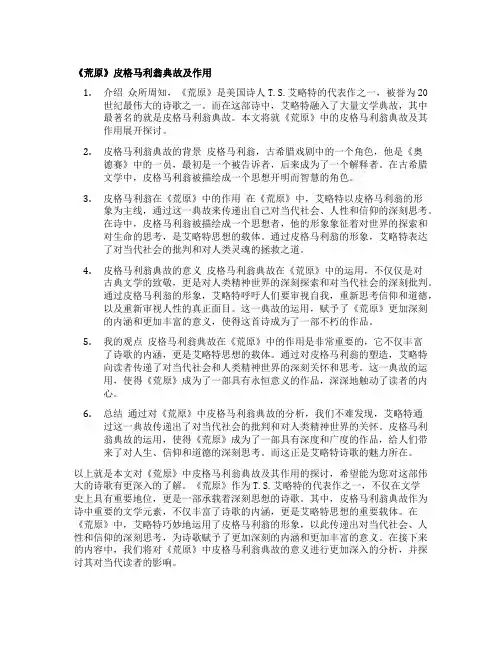
《荒原》皮格马利翁典故及作用1.介绍众所周知,《荒原》是美国诗人T.S.艾略特的代表作之一,被誉为20世纪最伟大的诗歌之一。
而在这部诗中,艾略特融入了大量文学典故,其中最著名的就是皮格马利翁典故。
本文将就《荒原》中的皮格马利翁典故及其作用展开探讨。
2.皮格马利翁典故的背景皮格马利翁,古希腊戏剧中的一个角色,他是《奥德赛》中的一员,最初是一个被告诉者,后来成为了一个解释者。
在古希腊文学中,皮格马利翁被描绘成一个思想开明而智慧的角色。
3.皮格马利翁在《荒原》中的作用在《荒原》中,艾略特以皮格马利翁的形象为主线,通过这一典故来传递出自己对当代社会、人性和信仰的深刻思考。
在诗中,皮格马利翁被描绘成一个思想者,他的形象象征着对世界的探索和对生命的思考,是艾略特思想的载体。
通过皮格马利翁的形象,艾略特表达了对当代社会的批判和对人类灵魂的拯救之道。
4.皮格马利翁典故的意义皮格马利翁典故在《荒原》中的运用,不仅仅是对古典文学的致敬,更是对人类精神世界的深刻探索和对当代社会的深刻批判。
通过皮格马利翁的形象,艾略特呼吁人们要审视自我,重新思考信仰和道德,以及重新审视人性的真正面目。
这一典故的运用,赋予了《荒原》更加深刻的内涵和更加丰富的意义,使得这首诗成为了一部不朽的作品。
5.我的观点皮格马利翁典故在《荒原》中的作用是非常重要的,它不仅丰富了诗歌的内涵,更是艾略特思想的载体。
通过对皮格马利翁的塑造,艾略特向读者传递了对当代社会和人类精神世界的深刻关怀和思考。
这一典故的运用,使得《荒原》成为了一部具有永恒意义的作品,深深地触动了读者的内心。
6.总结通过对《荒原》中皮格马利翁典故的分析,我们不难发现,艾略特通过这一典故传递出了对当代社会的批判和对人类精神世界的关怀。
皮格马利翁典故的运用,使得《荒原》成为了一部具有深度和广度的作品,给人们带来了对人生、信仰和道德的深刻思考。
而这正是艾略特诗歌的魅力所在。
以上就是本文对《荒原》中皮格马利翁典故及其作用的探讨,希望能为您对这部伟大的诗歌有更深入的了解。
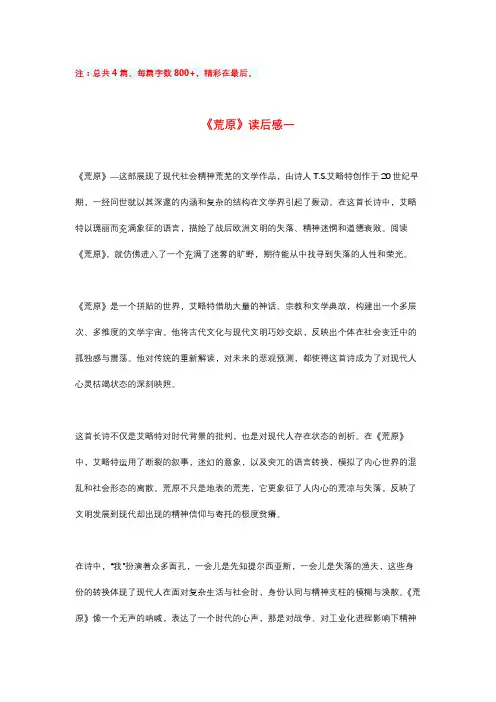
注:总共4篇、每篇字数800+,精彩在最后。
《荒原》读后感一《荒原》—这部展现了现代社会精神荒芜的文学作品,由诗人T.S.艾略特创作于20世纪早期,一经问世就以其深邃的内涵和复杂的结构在文学界引起了轰动。
在这首长诗中,艾略特以瑰丽而充满象征的语言,描绘了战后欧洲文明的失落、精神迷惘和道德衰败。
阅读《荒原》,就仿佛进入了一个充满了迷雾的旷野,期待能从中找寻到失落的人性和荣光。
《荒原》是一个拼贴的世界,艾略特借助大量的神话、宗教和文学典故,构建出一个多层次、多维度的文学宇宙。
他将古代文化与现代文明巧妙交织,反映出个体在社会变迁中的孤独感与震荡。
他对传统的重新解读,对未来的悲观预测,都使得这首诗成为了对现代人心灵枯竭状态的深刻映照。
这首长诗不仅是艾略特对时代背景的批判,也是对现代人存在状态的剖析。
在《荒原》中,艾略特运用了断裂的叙事,迷幻的意象,以及突兀的语言转换,模拟了内心世界的混乱和社会形态的离散。
荒原不只是地表的荒芜,它更象征了人内心的荒凉与失落,反映了文明发展到现代却出现的精神信仰与寄托的极度贫瘠。
在诗中,“我”扮演着众多面孔,一会儿是先知提尔西亚斯,一会儿是失落的渔夫,这些身份的转换体现了现代人在面对复杂生活与社会时,身份认同与精神支柱的模糊与涣散。
《荒原》像一个无声的呐喊,表达了一个时代的心声,那是对战争、对工业化进程影响下精神世界的焦虑和困惑。
震撼之余,《荒原》使我不禁自省,思考我们在快速发展的现代生活中,是否也感受到了那份荒芜与迷失。
似乎每个人都或多或少体会到了内心的不安与空虚——阅读这首诗,就像是在心灵的荒野中,寻找一条出路。
艾略特不仅诗意地提出问题,而且在结尾处给予了一线的希望。
通过暗示性的宗教元素和神话传说,他似乎在告诉我们,唯有回归精神的净化与自我探索,人类才能从这片“荒原”中复苏。
诗的尾声“Shantih Shantih Shantih”是梵语中的“平静”字面意思,为这部讲述纷乱世界的文本,带来了一丝宁静和冥想。
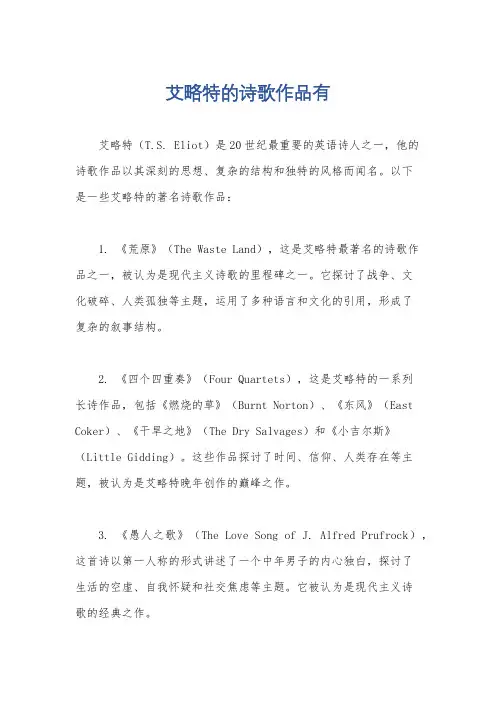
艾略特的诗歌作品有艾略特(T.S. Eliot)是20世纪最重要的英语诗人之一,他的诗歌作品以其深刻的思想、复杂的结构和独特的风格而闻名。
以下是一些艾略特的著名诗歌作品:1. 《荒原》(The Waste Land),这是艾略特最著名的诗歌作品之一,被认为是现代主义诗歌的里程碑之一。
它探讨了战争、文化破碎、人类孤独等主题,运用了多种语言和文化的引用,形成了复杂的叙事结构。
2. 《四个四重奏》(Four Quartets),这是艾略特的一系列长诗作品,包括《燃烧的草》(Burnt Norton)、《东风》(East Coker)、《干旱之地》(The Dry Salvages)和《小吉尔斯》(Little Gidding)。
这些作品探讨了时间、信仰、人类存在等主题,被认为是艾略特晚年创作的巅峰之作。
3. 《愚人之歌》(The Love Song of J. Alfred Prufrock),这首诗以第一人称的形式讲述了一个中年男子的内心独白,探讨了生活的空虚、自我怀疑和社交焦虑等主题。
它被认为是现代主义诗歌的经典之作。
4. 《亚伯拉罕之书》(The Book of Abraham),这是艾略特早期的一部叙事诗,以宗教和神话的元素为基础,探讨了个人的信仰和灵性追求。
5. 《灰烬》(Ash Wednesday),这是艾略特在转向天主教之后创作的一部长诗,探讨了信仰、救赎和灵性的主题。
除了以上列举的作品,艾略特还有许多其他诗歌作品,如《普鲁士的死人》(The Dead Prussian)、《马克斯·贝尔曼的诗》(The Poetry of Max Beerbohm)等。
他的诗歌作品风格多样,包括现代主义的实验性写作、宗教和神秘主题的探索,以及对社会和人类存在的深入思考。
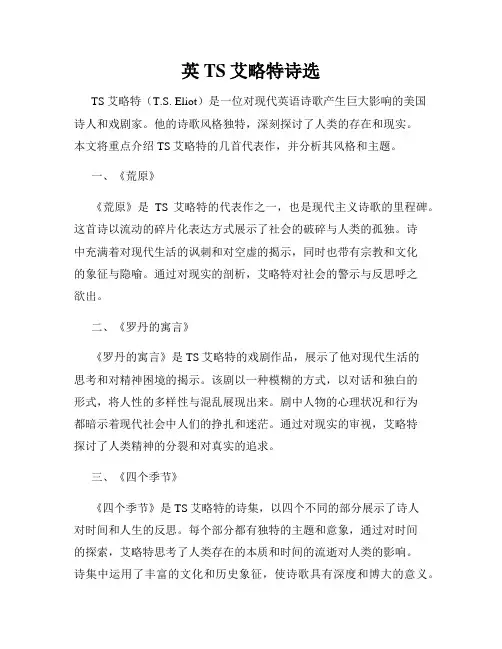
英TS艾略特诗选TS艾略特(T.S. Eliot)是一位对现代英语诗歌产生巨大影响的美国诗人和戏剧家。
他的诗歌风格独特,深刻探讨了人类的存在和现实。
本文将重点介绍TS艾略特的几首代表作,并分析其风格和主题。
一、《荒原》《荒原》是TS艾略特的代表作之一,也是现代主义诗歌的里程碑。
这首诗以流动的碎片化表达方式展示了社会的破碎与人类的孤独。
诗中充满着对现代生活的讽刺和对空虚的揭示,同时也带有宗教和文化的象征与隐喻。
通过对现实的剖析,艾略特对社会的警示与反思呼之欲出。
二、《罗丹的寓言》《罗丹的寓言》是TS艾略特的戏剧作品,展示了他对现代生活的思考和对精神困境的揭示。
该剧以一种模糊的方式,以对话和独白的形式,将人性的多样性与混乱展现出来。
剧中人物的心理状况和行为都暗示着现代社会中人们的挣扎和迷茫。
通过对现实的审视,艾略特探讨了人类精神的分裂和对真实的追求。
三、《四个季节》《四个季节》是TS艾略特的诗集,以四个不同的部分展示了诗人对时间和人生的反思。
每个部分都有独特的主题和意象,通过对时间的探索,艾略特思考了人类存在的本质和时间的流逝对人类的影响。
诗集中运用了丰富的文化和历史象征,使诗歌具有深度和博大的意义。
四、《荒漠之歌》《荒漠之歌》是TS艾略特的另一部重要作品,以对话的方式展示了现代社会中人们的孤寂和沉寂。
诗中描述了城市的冷漠和人们的空虚,反映了现代文明对人类生存的冲击。
艾略特使用了大量的象征和隐喻,揭示了人类在现代社会中的焦虑和迷失。
总结:TS艾略特是一位对现代英语诗歌产生重大影响的诗人和戏剧家。
他的诗歌作品展示了对现实的深入观察和对人类存在的反思。
通过各种诗歌形式和风格,他揭示了现代社会中的困惑和苦闷,呼唤人们对真实和精神追求的重视。
TS艾略特的诗选是现代诗歌的杰作,对后世诗人产生了深远的影响。
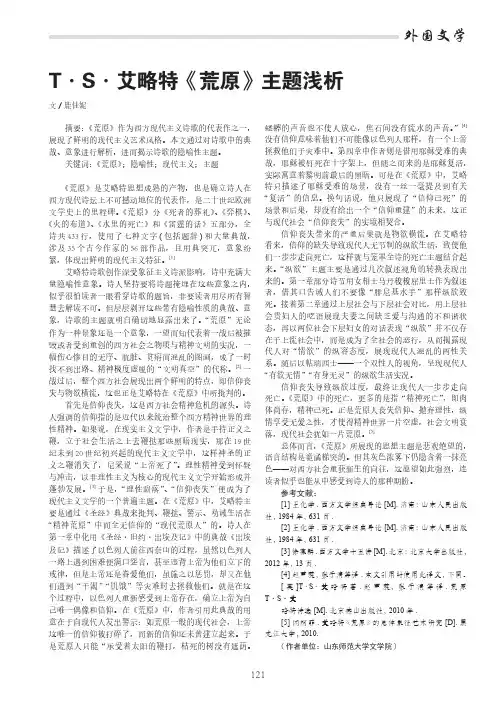
外国文学T·S·艾略特《荒原》主题浅析文/鹿佳妮摘要:《荒原》作为西方现代主义诗歌的代表作之一,展现了鲜明的现代主义艺术风格。
本文通过对诗歌中的典故、意象进行解析,进而揭示诗歌的隐喻性主题。
关键词:《荒原》;隐喻性;现代主义;主题《荒原》是艾略特思想成熟的产物,也是确立诗人在西方现代诗坛上不可撼动地位的代表作,是二十世纪欧洲文学史上的里程碑。
《荒原》分《死者的葬礼》、《弈棋》、《火的布道》、《水里的死亡》和《雷霆的话》五部分,全诗共433行,使用了七种文字(包括题辞)和大量典故,涉及35个古今作家的56部作品,且用典突兀,意象纷繁,体现出鲜明的现代主义特征。
[1]艾略特诗歌创作深受象征主义诗派影响,诗中充满大量隐喻性意象。
诗人坚持要将诗题掩埋在这些意象之内,似乎很怕读者一眼看穿诗歌的题旨,非要读者用尽所有智慧去解读不可。
但层层剥开这些带有隐喻性质的典故、意象,诗歌的主题就明白确切地显露出来了。
“荒原”无论作为一种景象还是一个意象,一望而知代表着一战后被摧毁或者受到重创的西方社会之物质与精神文明的实况,一幅伤心惨目的无序、肮脏、贫瘠而混乱的图画,成了一时找不到出路、精神极度虚脱的“文明真空”的代称。
[2]一战过后,整个西方社会展现出两个鲜明的特点,即信仰丧失与物欲横流,这也正是艾略特在《荒原》中所批判的。
首先是信仰丧失,这是西方社会精神危机的源头。
诗人强调的信仰指的是近代以来统治整个西方精神世界的理性精神。
如果说,在现实主义文学中,作者是手持正义之鞭,立于社会生活之上去鞭挞那些黑暗现实,那在19世纪末到20世纪初兴起的现代主义文学中,这样神圣的正义之鞭消失了,尼采说“上帝死了”。
理性精神受到怀疑与冲击,以非理性主义为核心的现代主义文学开始形成并蓬勃发展。
[3]于是,“理性陨落”、“信仰丧失”便成为了现代主义文学的一个普遍主题。
在《荒原》中,艾略特主要是通过《圣经》典故来批判、鞭挞、警示、劝诫生活在“精神荒原”中而全无信仰的“现代荒原人”的。
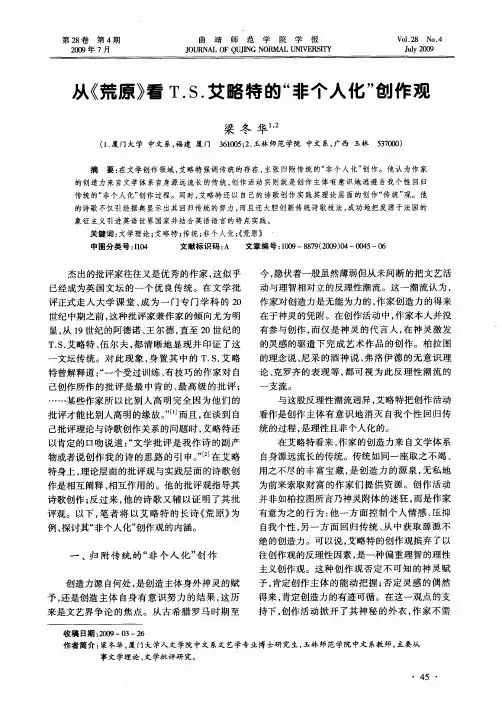
T·S·艾略特的“非个人化”理论与《荒原》写作T.S.艾略特认为,“非个人化”是诗歌艺术取得成功、达至完美境界的保证,因而在诗歌写作中极力加以实践。
但是,诗人个人的情感、观点等“个人化”因素要想完全排除在诗歌之外又绝非易事,也绝不可能。
所以,在艾略特的诗歌写作中,尤其是在《荒原》的写作中,明显存在着“非个人化”理论贯彻与背离的张力。
美国诗人、文论家T.S.艾略特诗论的核心是“非个人化”。
艾略特认为,诗歌艺术传达的应是人类普遍的情感与经验,而不是诗人自己的个性、经验、情绪等个人化因素。
“非个人化”是诗歌艺术取得成功、达至完美境界的保证。
艾略特说:“诗歌不是感情的宣泄,而是对感情的摆脱,诗歌不是个性的表现,而是对个性的摆脱。
”[1](P21)“一个艺术家的成长意味着持续不断的自我牺牲、持续不断的个性的消亡。
”[1](P17)艾略特的这一主张提出于1917—1923年间,而其诗歌名篇《荒原》的写作也正处于这一时期,所以,学术界一般认为,《荒原》正是这种文学观念的体现。
现代心理学证明,创作者的心理状态、思想观念等个人化因素与文学作品的主旨倾向,乃至文本的结构状况等不可能不发生关系。
作者在创作中虽然企图摆脱自己的情绪,以便能够以一种局外人的超然状态来处理材料、控制创作流程,但事实上,该企图只是一种主观的愿望,并不符合创作实际。
文学作品源于作者的心灵,它也只能是作者心灵的反映。
所以,艾略特的诗学理论在具体的诗歌创作中很难得到完整、彻底的贯彻。
作家进行创作,意识与无意识都起着至关重要的作用,这是一个已被现代创作心理学所证明的事实。
艾略特《荒原》的写作情况实际上也应该是这样。
个人化是无意识的,而非个人化则是有意识的。
个人化决定了诗歌的基本思想、情感走向等内容性因素,而非个人化则成就了诗歌的材料处理方式以及语言的运用、结构的创造等形式方面的营构。
所以,在《荒原》的写作中,明显地存在着“非个人化”理论贯彻与背离的张力。
艾略特的诗中英
TS艾略特(T.S.E1iot)是一位伟大的英国现代主义诗人,以下是他的一首著名诗歌《荒原》(TheWaste1and)的原文和中文翻译:
原文:
Apri1isthecrue11estmonth,breeding
1i1acsoutofthedead1and,mixing
Memoryanddesire,stirring
Du11rootswithspringrain.
Winterkeptuswarm,covering
Earthinforgetfu1snow,feeding
A1itt1e1ifewithdriedtubers.
中文翻译:
四月是最残忍的月份,它在死寂的土地上育出丁香,
使记忆和欲望交织在一起,煽动
春雨中沉闷的根。
冬天保持着我们的温暖,覆盖
忘却的雪覆盖大地,以枯槽喂养
那一点点幼命。
以上只是《荒原》的开头部分,整首诗包含了许多不同的段落和主题,使用了丰富的象征和意象。
这首诗被认为是艾略特最重要的作品之一,具有复杂的结构和多样的语言风格,探索了现代社会的困惑、疏离和虚无感。
英国诗人T·S·艾略特生平简介托马斯·斯特尔那斯·艾略特(通称T·S·艾略特),英国诗人、剧作家和文学批评家,诗歌现代派运动领袖。
出生于美国密苏里州的圣路易斯。
代表作品有《荒原》、《四个四重奏》等。
下面是店铺为大家整理的英国诗人T·S·艾略特生平简介,希望大家喜欢!T·S·艾略特简介T·S·艾略特是一位著名的诗人、剧作家和文学批判家,是诗歌现代派运动领袖。
T·S·艾略特1888年出生于美国密苏里州的圣路易斯。
T·S·艾略特在1948年获得了诺贝尔文学家,可见他的成就很高。
艾略特的祖父是一位牧师,他曾经担任了大学的校长,父亲是经商的,母亲是一位诗人,写过很过宗教诗歌。
艾略特曾经在哈佛大学学习哲学和比较文学,还接触了梵文和东方文化,对黑格尔派的哲学也十分有兴趣,曾经受到了法国象征主义文学的影响。
1914年,艾略特认识了美国著名的诗人庞德。
在第一次世界大战爆发之后,他就来到英国,并定居在了伦敦,先后做过银行职员和教师等职业。
1922年,T·S·艾略特创办了文学评论季刊《标准》,担任了主编,一直到1939年才辞去。
艾略特认为自己在政治上是保皇党,文学上是古典主义者。
在1922年T·S·艾略特所发表的《荒原》为他赢得了国际名誉,并被评论界看作是二十世纪最具有影响力的一部诗作,也被认为是英美现代诗歌的里程碑。
1927年,艾略特加入了英国国籍,成为了英国人。
1943年艾略特结集出版的《四个四重奏》使他获得了1948年度诺贝尔文学奖,同时也确立了当时在世的最伟大英语诗人和作家的地位。
T·S·艾略特晚年致力于诗剧创作,1965年艾略特在伦敦逝世,享年77岁。
T·S·艾略特的成就1916年4月,艾略特完成了博士论文,但因为他拒绝回国而失去了学位。
T·S·艾略特和《荒原》一、生平、创作和文艺思想艾略特于1888年9月出生于美国密苏里州的一个清教徒家庭。
其祖父创办了华盛顿大学,父亲是成功的商人,母亲出身名门,爱好文学。
其家庭具有较高的文化修养。
1906年入哈佛求学,攻读哲学和英法文学,受业于新人文主义者欧文〃白碧德。
1909年大学毕业入研究院继续研究哲学。
1910年获哈佛大学硕士学位。
后曾在牛津读书,亦在法国和德国求过学。
但时间不长,主要学习哲学。
1914年艾略特去伦敦,并长期定居英国,1927年加入英国籍。
因此原因,文学史上对他究竟算是英国人还是美国人说法不一。
移居伦敦后,艾略特与美国意象派诗人庞德结识,一起从事诗歌创作活动。
庞德给予艾略特很大帮助。
艾略特对现实是敏感的,尤其是对文化和人的精神状态。
他清醒的看出了一次大战前后欧洲遭遇的文明危机,这种危机不仅体现在现实生活里,而且反映在人的灵魂中。
1915年发表的《阿尔弗雷德〃普鲁弗洛克的情歌》就是这样一种描述危机感的长诗。
它以当代一个资产阶级中年男子在求爱途中错综复杂的心理,表现了当代西方人对现代文明、对人生所感到的幻灭和迷惘的心情。
1922年,艾略特在《标准》季刊创刊号上发表了著名长诗《荒原》,轰动英美文坛。
1922-1939年艾略特一直担任《标准》杂志主编。
1939年后曾投身银行界。
艾略特的政治思想和文化思想有不少消极因素,这与他的宗教观有很大关系。
1927年入英国籍后继而入英国国教。
他曾在一序言上写道:他是个“文学上的古典主义者,政治上的保皇党,宗教上的英国天主徒”。
这种思想明显地流露在其创作中。
在他后期的创作中,他的这些倾向表现的更为清楚。
1943年出版的长诗《四个四重奏》是其后期创作的最重要的作品,以宗教为题材,宣扬“原罪论”,要人们忍辱负重,受苦受难,才能在赎罪的净火中获得拯救。
自三十年代后期,艾略特的创作转向戏剧,但内容则主要是宗教剧。
其中较为著名的有:《大教堂凶杀案》、《一家团圆》、《鸡尾酒会》。
荒原的内容及艺术特色一、荒原的内容说到《荒原》,这可不是个简单的诗集,它就像一幅抽象画,让你一开始看不懂,但越看越觉得其中有深意。
作者T.S.艾略特(T.S. Eliot)通过这本诗集描绘了现代人内心的空虚与焦虑,像是丢失了方向的船只在风浪中漂浮。
整本书给人一种压抑的感觉,仿佛所有的希望都在逐渐消失,留下的只是碎片化的记忆和无尽的沉默。
真的是让你看了之后,心里有种说不清的感觉:好像身边的世界在变坏,而我们却无法做什么。
诗集分为五个部分,讲的全是一些极为荒诞和梦幻般的场景,跳跃式的内容让人感觉像是进入了一场不合逻辑的梦境。
比如开头第一部分《死水》,就是描述一种枯萎的景象,水面上静得让人无法想象,死气沉沉的氛围几乎让人喘不过气来。
你想象一下,大家都在赶着做事,却不知为什么一切又都停滞了。
是不是有点像现代社会中的忙碌呢?大家都在奔波,却始终感觉不到自己朝着什么目标走。
还有一部分叫做《一片叶子》,它讲的是人的迷茫和无助。
你会看到那些身陷困境的人,走在充满尘土和死寂的荒原上,什么也得不到,什么也看不见。
诗人通过这些意象,表现了人类面对文明的衰退和心灵的荒芜,仿佛什么都没有,只剩下孤独。
二、荒原的艺术特色说到《荒原》的艺术特色,这本书的写作风格实在是让人眼前一亮。
你能感受到艾略特的文字像是急切地从心底冒出来,里面有一种很强的情感波动,不像是传统的诗歌那样整齐有序。
每一行诗,仿佛都是一块拼图,不是拼成一个完整的画面,而是让你在阅读过程中慢慢拼凑出一种情感的碎片。
这种感觉有点像是你把一个蛋糕切成了无数小块,每一块都有不同的味道,却又共同营造出一种复杂的情绪。
艾略特的诗歌语言有时候会让你摸不着头脑,字面上的意思并不容易理解,但背后的深层含义却能打动你。
比如他用大量的神话、历史、宗教等元素来表现诗中的情感。
这些文化背景就像是沙漠中的细沙,慢慢渗透到每个角落,虽然你可能一开始不明白,但它们却让诗歌的内涵更深刻。
艾略特喜欢用多重的象征手法,把不同的意象串联在一起,给读者一种既陌生又熟悉的感觉。